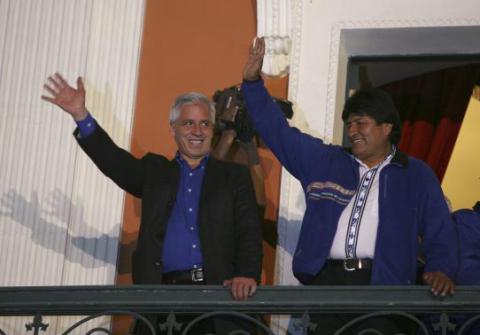(Reuters) - Bolivian President Evo Morales declared a landslide re-election victory on Sunday, hailing it as a triumph for socialist reforms that have cut poverty and vastly expanded the state's role in the booming economy.
Official results were slow coming in but an exit poll and a quick count showed Morales, a former coca grower, trouncing his opponents with about 60 percent of the vote and easily winning a third term in power.
Morales, who became Bolivia's first indigenous leader in 2006, will now be able to extend his "indigenous socialism", under which he has nationalized key industries such as oil and gas to finance welfare programs and build new roads and schools.
"This was a debate on two models: nationalization or privatization. Nationalization won with more than 60 percent (support)," Morales told thousands of cheering supporters from the balcony of the presidential palace.
A prominent member of the bloc of socialist and anti-U.S. leaders in Latin America, Morales dedicated his victory to Cuba's former communist leader Fidel Castro.
"This win is a triumph for anti-imperialists and anti-colonialists," Morales said.
His folksy appeal and prudent spending of funds from a natural gas bonanza to finance welfare programs, roads and schools have earned the 54-year-old wide support in a country long dogged by political instability.
Fireworks exploded over the palace - dubbed the "Burned Palace" in reference to Bolivia's history of coups - as Morales loyalists chanted "Evo, Evo".
A Mori exit poll released by Unitel television showed Morales winning 61 percent of the vote. His closest rival, businessman Samuel Doria Medina, had 24 percent.
A quick count released by local TV channel ATB showed Morales with 60.5 percent of the vote.
The exit poll and quick count also showed Morales' Movement Toward Socialism reinforcing its grip on both the lower and upper houses in Congress, meaning he will be able to easily push through further reforms should he chose.
One international observer said anonymously that the Electoral Supreme Court had a delay with the electronic data. It was not clear whether official results would be released overnight or on Monday.
CHARISMA
"I voted for Morales," said Flavia Nunez, a 50-year-old office clerk, in central La Paz. "These other right-wing candidates would take us back in time. I don't want that."
Morales' rivals struggled to match his charisma or offer the Andean country's 6 million voters a more compelling vision for the economy, often focusing instead on corruption and the illegal drugs trade.
Morales campaign billboards ran the slogan "With Evo we're doing well".
Voters agreed, giving him another five-year term that means he will remain in office until January 2020.
He has delivered economic growth averaging above 5 percent a year, also winning plaudits from Wall Street for running fiscal surpluses.
Under Morales, the number of Bolivians living in extreme poverty has fallen to one in five from more than a third of the population of 10 million in 2006.
Even so, Bolivia remains one of the poorest countries in the Americas.
Morales' critics accuse him of using his power to control the courts and of violating the constitution which limits a president to two consecutive terms.
Morales has said he will not run again at the next election in late 2019.
His comfortable victory on Sunday extinguished the hopes held by some voters for change.
"This government has had two terms and I don't like it when a small clique lingers on in power," economist Miguel Angel Perez, 53, who voted for Quiroga, said before the results were announced.
(Additional reporting by David Mercado, Monica Machicao and Daniel Ramos; Writing by Richard Lough; Editing by Eric Walsh and Kieran Murray)


Spread the word